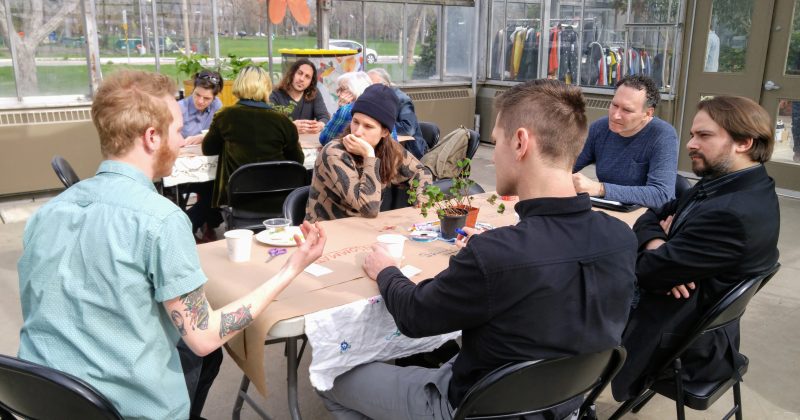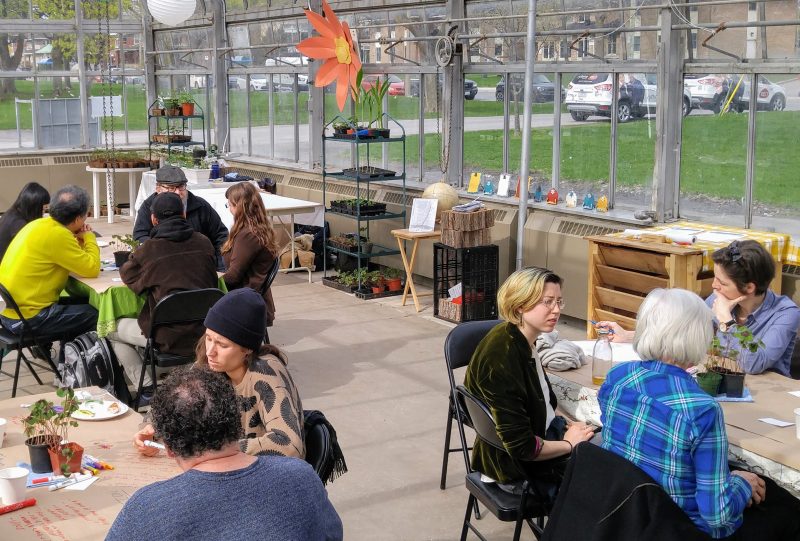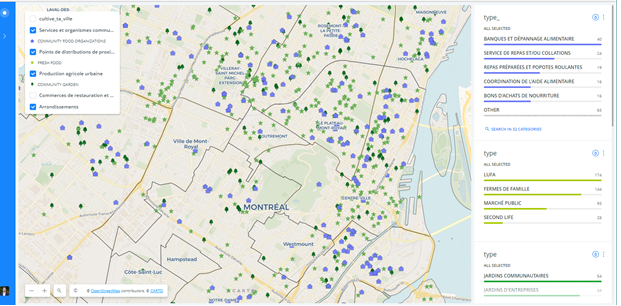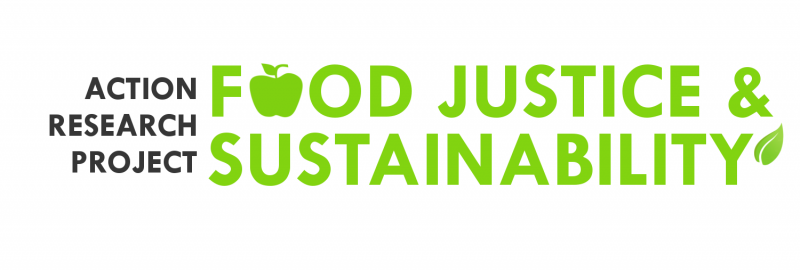As the Earth Action Day on September 27, 2019, approaches, we are reminded of the significant global challenge we all face: the climate emergency. Other than march with students and youth, what else can we do to address it? One project at Dawson proposes that we take on the biggest test for our future by thinking about something we all need: food. By doing so, students, faculty, and our community can begin to transform our local communities and environment, thus contributing to Montreal’s turn towards a sustainable, urban future.
 Meet the food justice and sustainability (FJS) team at Dawson College. This group came together in 2016 through funding from two Community and College Social Innovation grants, awarded by the Social Science and Humanities Research Council. It has partnered with local neighborhoods and networks in Montreal along with university researchers. The goals of the FJS team are to understand how and what we eat every day, to tackle the pressing issues of justice and inequality in what we eat, and to understand how our choices impact health, our community and the environment.
Meet the food justice and sustainability (FJS) team at Dawson College. This group came together in 2016 through funding from two Community and College Social Innovation grants, awarded by the Social Science and Humanities Research Council. It has partnered with local neighborhoods and networks in Montreal along with university researchers. The goals of the FJS team are to understand how and what we eat every day, to tackle the pressing issues of justice and inequality in what we eat, and to understand how our choices impact health, our community and the environment.
What does this involve? One key aspect of the FJS project started with students, right here at Dawson.
Researchers and practitioners in the field differentiate between food security, food sovereignty, and food justice. Food security and insecurity refer to an individual or household’s ability have adequate and secure access to food; inadequate and insecure access is due to financial constraints.
Food sovereignty refers to a community’s or government’s right to choose the way their food is produced and consumed to respect their livelihoods. Historically, it originated with Via Campesina in 2009 and has been primarily associated with mobilization for peasant’s rights in the global South, though it has been extended more broadly to growing local food and thus to urban agriculture initiatives in the global North.
Food Justice refers to the social and geographic inequities that affect access to fresh healthy food, such as racism, social class, or neighborhoods wherein healthy food is not available, accessible, or affordable. See K.V. Cadieux and R. Slocum, What does it mean to do food justice? Journal of Political Ecology 22 (2015): 1-26.
From the students and the community: a novel idea and research agenda
The FJS project at Dawson began with a simple challenge in teaching: how to connect the overwhelming issues of climate change and sustainability with direct and meaningful ideas that help students both understand the issues more deeply as well as critically engage with problems and solutions. I began to answer the challenge put to me by students in Environmental Studies classes: what, students, wondered, can we do now? Through in-class dialogue and proposals as well as a fortuitous opportunity to work with Alternatives (a local community group), the students took on the project of growing food in urban settings by establishing the Dawson rooftop gardens project. With the support of Sustainable Dawson and a dedicated group of teachers, the environmental and social impact of growing our own food on campus became a part of the Dawson community experience. From there, the FJS project and student research into the broader Montreal community began to grow.
 Going beyond these initial experiences, Dawson students have been able to explore in greater depth the food resources that are available in our neighborhood through a course titled Advanced Studies in Sociology. This exploration was a direct response to the needs of a local community-based food security organization: what food resources are available in our neighborhood? How do we know what these resources are? Most importantly, how can we better collaborate with organizations and individuals to address the needs of the community? With Gaelle Janvier, our main community partner from Alternatives, students mapped several neighborhoods in Montreal with a focus on the local food system and food assets – that is, the resources available to residents and citizens where they can benefit from growing, sharing, receiving and learning about food.
Going beyond these initial experiences, Dawson students have been able to explore in greater depth the food resources that are available in our neighborhood through a course titled Advanced Studies in Sociology. This exploration was a direct response to the needs of a local community-based food security organization: what food resources are available in our neighborhood? How do we know what these resources are? Most importantly, how can we better collaborate with organizations and individuals to address the needs of the community? With Gaelle Janvier, our main community partner from Alternatives, students mapped several neighborhoods in Montreal with a focus on the local food system and food assets – that is, the resources available to residents and citizens where they can benefit from growing, sharing, receiving and learning about food.
From this experience, our research team and partnerships with local neighborhoods shifted to focusing more broadly on an array of issues related to food justice and sustainability.
Why food justice and sustainability?
According to the newly released United Nations (UN) Intergovernmental Panel on Climate Change (IPCC) assessment report on land use, 107 researchers from over 50 countries warn that if we do not limit the impacts of greenhouse gas emissions to 1.5 degrees Celsius, world food security is significantly at risk. With over 500 million people already living in areas that experience desertification, over-taxed and threatened fertile soil and agricultural production could significantly affect a burgeoning global population currently under stress.[1] This report and other news reports make it clear that our daily habits are related to both local and global issues such as deforestation and land conversion in the Amazon. Better understanding of these linkages, thinking about changes to these habits and finding solutions that benefit everyone are central to securing a future that is both more sustainable and just for all.[2]
These are not just global, remote changes, however. They also impact us here in Montreal. With rising food insecurity rates in Montreal (food insecurity and food bank usage has increased steadily since 2008 despite economic gains) and the hottest month on record in July 2019, these are deeply local and personal issues.[3] Understanding how we can build a more sustainable food system in Montreal – where we are less dependent on global supply, capable of weathering the hot and cold months better in the future and provide adequate and affordable food for many of our city’s residents – is the primary occupation and agenda of the FJS project.
Having students think critically about solutions to inequality as well as sustainability in Montreal is thus part of a larger, global agenda to address the challenge of feeding a growing population more sustainably in the face of global development and urbanization.
The FJS Project: what we do
How are we contributing to the food landscape and the challenge of food justice and sustainability in Montreal? First, we learned through our experience with students and our first grant that information is key. By using access to information requests, scouring online data sources and developing a data audit of available resources, we gathered information and developed a methodology for documenting the food system in Montreal, neighbourhood by neighbourhood. To assist residents in better understanding their neighborhood and the food options available to them, we developed a series of online tools. Key among these tools is a map which visually represents over 14,000 data points about the food system in Montreal, from production (growing food) to distribution (buying food) to waste (reducing our food waste). We are in the process of developing version 2.0 of our Montreal food map, but you can check out version 1.0 here. We continue to develop this data for community organizations to support their planning and implementation in phase two of our grant.

Screen shot of the Montreal Food Map
Second, we prioritized the development of and support for research-community partnerships. Early in our work, it became clear that researchers were producing good information and data that was not and could not easily be translated into good policy and knowledge to benefit local communities. In response, we host monthly meetings that bring together organizations and researchers from across Montreal, as well as Dawson faculty and students, to discuss pressing challenges and possible solutions in local food policy. Sessions in the 2018-2019 academic year included discussions on zero hunger, housing and food security, and local neighborhood initiatives, just to name a few.
Finally, in our current grant, in partnership with other researchers, we are collecting original data and conducting applied research to directly benefit local neighborhoods in their understanding, assessment and engagement with resources. This involves partnering closely with three neighborhood food security roundtables to track the implementation of local action plans to understand how and why communities succeed or fail in their efforts to change the food system. Partners in this initiative include Grand Potager in Verdun, the NDG Coalition for Food Security in NDG, the Institute for Health and Social Policy at McGill, the McGill Centre for the Convergence of Health and Economics (MCCHE), as well as other community organizations and researchers.
Most importantly, this work includes Dawson students who have been intimately involved in tracking local private gardens in Parc Extension, conducting their own mapping and research of local initiatives, and contributing to the overall research agenda since we began mapping Montreal’s food resources in 2013. Through their involvement in this research and the rooftop gardens, both volunteers and students have contributed to assessing and changing their own eating habits, as well as creating awareness about the Montreal environment.
Dawson students, through their class projects with FJS, engage directly with developing several of the Graduate Profile outcomes such as critical thinking and problem solving, communication, teamwork, health and well-being and of course, social responsibility and community engagement.
What’s coming up?
The FJS project is beginning the 2019-2020 year with a number of activities that will be open to Dawson students, staff and faculty. The first is a hosted talk on September 26, 2019, focused on climate justice and food justice before the climate march on September 27, 2019. We are excited to welcome back Laurence Lavigne-Lalonde to Dawson as a speaker. A city councillor for Maisonneuve-Longue-Pointe, she is a member of the city’s executive committee and is responsible for environmental transition and resilience, Espace pour la vie, and urban agriculture in Montreal. Check out the event details at Eventbrite and register for a free ticket. To keep up with the project and future talks, visit our Facebook page.
Changing the climate has been the overarching goal of the FJS project since its initial funding in 2016. However, this initiative builds upon both the interest and dedication of the Dawson community. We look forward to continuing to share with you.
Endnotes
[1] IPCC, Special report on climate change and land: an IPCC special report on climate change, desertification, land degradation, sustainable land management, food security, and greenhouse gas fluxes in terrestrial ecosystems, (Cambridge University Press, Cambridge, United Kingdom and New York, NY, USA, 2019). Retrieved at: https://www.ipcc.ch/report/srccl/.
[2] For one recent headline, see A. Symonds, “Amazon rainforest fires: here’s what’s really happening,” New York Times, August 23, 2019. Retrieved from https://www.nytimes.com/2019/08/23/world/americas/amazon-fire-brazil-bolsonaro.html.
[3] Despite an expansion in anti-poverty programs since 2008-2009, food insecurity has increased across Canada. This is especially true for Northern communities. Almost half of all households in Nunavut are food insecure. See V. Tarasuk, A. Mitchell, N. Dachner, Household food insecurity in Canada, 2014. (Toronto: Research to identify policy options to reduce food insecurity, (PROOF) 2016). Retrieved from https://proof.utoronto.ca/.




